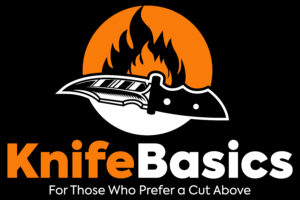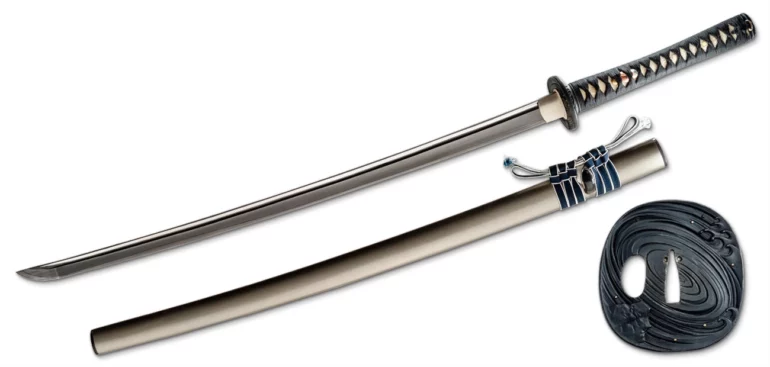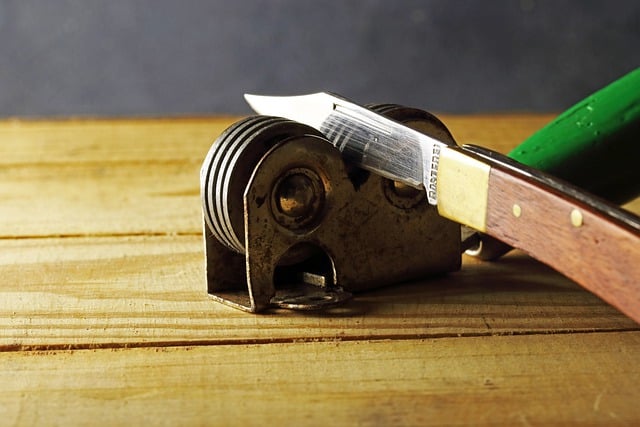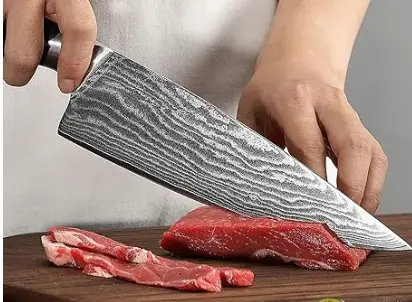Table of Contents
What is L6 steel?
L6 steel is an oil-hardened tool steel with a fine grain microstructure and offers excellent shock resistance. L6 also referred to as L6 Bainite steel, is special and not very common on the market because it takes a lot of time to manufacture.
Why is it special? L6 steel is special because it is heated and worked on to form Bainite, which gives the steel a high hardness level and the ability to hold a sharp edge longer.
However, it is not commonly used because it takes a lot of time and energy to manufacture, making it very expensive. This explains why L6 Swords are not very common on the market.
L6 steel was originally bandsaw steel but is commonly used to make forming dies, bearings, rollers, drills, punches, knives, and Swords
Composition of L6 Steel
- Carbon C 0.75%: Increases edge retention, hardness, and tensile strength. It also improves steel resistance to wear, abrasion, and corrosion.
- Chromium Cr 0.85%: Formation of Chromium carbides. Increases the blade’s hardness, tensile strength, and corrosion resistance.
- Vanadium V 0.30%: inhibits grain growth during elevated temperature processing and heat treatment, which enhances the strength and toughness of steel. It also forms carbides that increase wear resistance.
- Molybdenum Mo 0.25%: increases toughness and hot hardness. It also improves hardenability and forms carbides for wear resistance.
- Nickel Ni 1.75%: greatly improves resistance to oxidation and corrosion.
- Phosphorous P 0.03%: Considered an impurity but may Increase the strength and improves the machinability of steel
- Manganese Mn 0.85%: improves the strength and hardness of steel. When the steel is heat-treated, hardenability is improved with increased manganese.
- Silicon Si 0.20%: Increases strength and heat resistance.
- Sulfur S 0.03%: Improves machinability but is regarded as an impurity in high quantities.
Properties of L6 steel
L6 Steel Hardness
L6 steel offers a Rockwell hardness of up to 64 HRC depending on the heat treatment. This is a high hardness level that categorizes L6 as hard steel. Because of its hardness level, L6 does not deform easily and is therefore suitable for manufacturing tools that can handle abuse like a bandsaw.
On the downside, L6 bainite steel is extremely hard to work with and achieves optimum hardness level. The higher hardness level also makes it very challenging to sharpen, even with modern, sophisticated sharpening tools.
L6 Steel Toughness
L6 steel stands out for its excellent toughness, which gives it an outstanding ability to withstand impact and shocks. L6 sword blades do not break, chip, or crack when used for tough or challenging applications. This toughness is a good sign that you can depend on your Swords for tough applications.
L6 bainite steel toughness decreases with increased hardness, making it very popular for swords. At around 58 HRC, the toughness of L6 is better than most other blade steels like 80CrV2 steel, 52100 steel, and 1084 Steel.
L6 Steel Wear resistance
Being hard steel, L6 offers excellent wear resistance. Swords made with this steel can withstand abrasion and wear without material loss. The Swords will not show signs of wear with regular usage and sharpening. L6 Swords are long-lasting and can serve you across generations.
L6 Steel Edge retention
Due to its high hardness level, L6 blades hold a sharp edge and stay sharp for a long time. With its level of edge retention, you will not be required to sharpen the blades after a few cuts. Edge retention is a major consideration when buying swords for many users, and L6 Swords pass that test.
L6 blade steel edge retention will mostly depend on the Rockwell hardness achieved during the heat treatment. Its edge retention is similar to other steels like 80CrV2, 1084, and 8670 when hardened to deliver optimum toughness and edge retention.
L6 Steel Corrosion resistance
L6 steel is not stainless steel as it does not contain the required amounts of chromium to make it stainless. It however contains some percentage of Nickel which improves its corrosion resistance over other sword steels like 1084.
It is prone to rust which calls for proper care and maintenance. To prevent L6 blades from rusting, wash and dry them after every use. Also, apply a coat of oil on the blades and remove them from their sheath for long-term storage.
Ease of Sharpening L6 Steel
Another downside of L6 is that it is very difficult to sharpen, which is attributed to its wear resistance and hardness. This does not mean it is impossible to get a sharp edge, but it will take a lot of time and energy. Sharpening L6 Swords will be more challenging if you lack Sword sharpening skills.
L6 steel comparison
L6 vs. T10 steel
T10 and L6 steel have a lot in common. They both have low amounts of chromium and are prone to rust and corrosion. They also offer high toughness, hardness, and great edge retention. T10 provides a hardness level of up to 67HRC, which is attributed to tungsten in its composition.
T10 steel’s higher hardness enables it to offer better edge retention, and wear resistance than L6. L6 will on the other hand offer better toughness than T10 sword steel and is more suitable for tough applications.
L6 Steel vs 1095 steel
L6 steel contains less carbon than 1095 steel however they both harden to an almost equal Rockwell hardness. Despite offering a similar hardness level L6 tends to offer better toughness than 1095 steel, L6 tends to offer more abrasive wear-resistant. Hence L6 is more suitable for swords to be applied in tougher applications.
1095 steel is easier to work with in terms of forging and heat treatment, on the other hand, L6 is extremely difficult to work with. This aspect makes the L6 blades more expensive than the 1095 steel blades.
Is L6 Good Sword steel?
Whether steel is good or bad for Sword making depends on the Sword properties you are looking for. L6 steel is excellent Sword steel for Swords to be used in tough applications.
On the other hand, it is not stainless steel and therefore prone to rusting when exposed to moisture or corrosive environments. L6 swords are also extremely expensive and not widely available.




